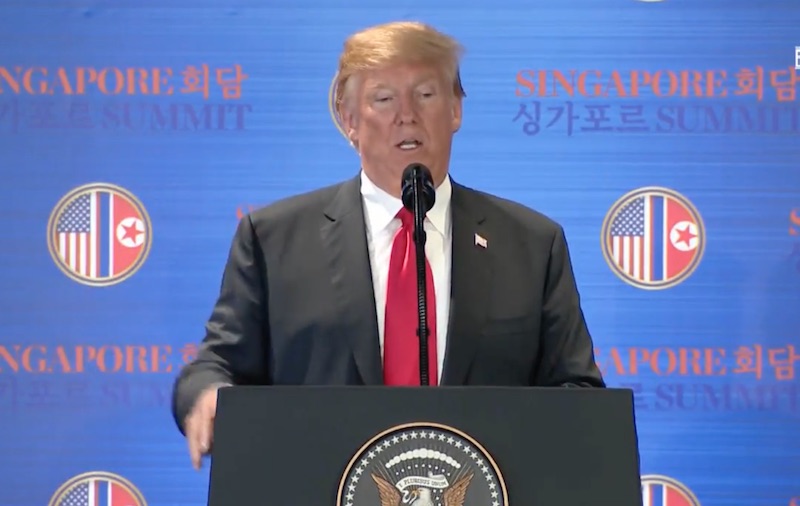Describing longstanding US-South Korea war games as “inappropriate” and “provocative,” US President Donald Trump seemed to suggest he was ready to scrap them entirely as today’s historic US-North Korean summit came to an end in Singapore.
The suggestion was one of several nuggets not included in the official document signed by Trump and Kim Jong Un to emerge at a discursive hour-long press conference that included digs at past US administrations, and a bizarrely propagandistic video that he repeatedly assured reporters North Korea loved.

Citing Kim’s avowed “unwavering commitment to complete denuclearization,” Trump went so far as to say he believed Kim would start the process as soon as he landed back home. “I believe he will start this process right away,” he said.
Explaining exactly how the world will verify that is taking place or pinpointing any sort of timetable for those moves proved far trickier.
Denuclearization will come “As fast as it can be done scientifically. As fast as it can be done mechanically,” Trump explained at one point, telling reporters that he “used to discuss nuclear” with an MIT professor uncle “all the time.”
Verification will, of course, be key to any deal given North Korea’s track record. A 1993 deal struck with the Clinton administration infamously saw billions in aid sent to the hermit kingdom in return for what ultimately proved to be nothing, as the regime had secretly maintained its nuclear program.
Kim Jong Un brought up that well-documented deception unprompted during their discussions today, according to Trump.
“In one case, they took billions of dollars and nothing happened. He brought it up to me,” Trump said, adding that Kim admitted his government had “never gone this far” before in negotiations.
As to why such negotiations had never taken place before, Trump was quick to point to his own negotiating skills.
“Well, you have a different administration. you have a different president. We get it done. The other groups, maybe it wasn’t a priority,” he said in a transparent dig at the Obama administration.
Trump also touted his dealmaking in securing the closure of a powerful “engine testing site” during negotiations, a concession not noted in the final, signed document.
“Do me a favor. Can you close it up?” he said he asked.
That, apparently, was enough to do the trick.
Questions about human rights violations in North Korea, meanwhile, which were peppered throughout the lengthy press conference, were generally downplayed or swatted aside.
“The man you met today has killed family members, starved his own people, is responsible for the death of Otto Warmbier… why are you so comfortable calling him ‘very talented?’” asked an NBC reporter.
Trump responded by saying that Kim had proven himself very talented in the way he had been able to take over a country at just 26 years of age and “run it tough.”
The parents of Warmbier, meanwhile, who was returned to the US from North Korea in a vegetative state after being imprisoned for tearing down a political banner, were no doubt thrilled to discover their son “did not die in vain.”
Warmbier was repatriated back to the US in a coma after 17 months in captivity and died six days after his return.
“I think without Otto, (the summit) would not have happened,” Trump said, without condemning North Korea. “Special young man.”
While emphasizing that “nuclear is always #1 to me,” Trump assured reporters that he did discuss the matter of human rights abuses with Kim, and will be discussing it with him again in the future.
“It’s a rough situation over there, no doubt about it,” he said, before quickly adding “It’s rough in a lot of places, not just there.”
When asked about what he expects Kim to do about the human rights issue in North Korea, the answers quickly turned very vague.
“[The North Koreans] will be doing things. I think [Kim Jong Un] wants to do things,” Trump said.
“Things will be happening,” Trump assured another reporter who asked about North Korea’s harshly oppressed Christian population.
No further specifics were forthcoming, though the assurance of “things” happening on the human rights front was no doubt a great comfort to the estimated 200,000 people living in North Korea’s brutal gulag system, whom Trump took time to specifically mention.
“Not much I can do right now. I think at a certain point [Kim’s] going to do something about it,” the president said of the countless political prisoners.
“I think they are one of the great winners today — that large group of people that you’re talking about. I think ultimately they are going to be one of the great winners as a group.”




